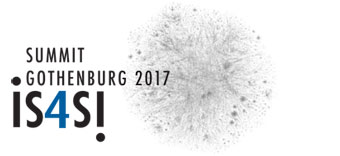Seventh International Conference on the Foundations of Information Science
Structure, Dynamics, Complexity in the Informational Nature
Foundations of Informational Science, FIS is both a scholarly network of researchers active in variety of research fields converging into an emerging interdiscipline of Information Science http://fis.sciforum.net/, and a conference series with its beginning more than twenty years ago.
Past FIS Conferences
1994 – First conference on Foundations of Information Science: From computers and quantum physics to cells, nervous systems, and societies. Madrid, Spain, July 11-15, 1994.
1996 – Second conference on Foundations of Information Science: The Quest for a Unified Theory of Information. Vienna, Austria, June 11-15, 1996.
2005 – Third conference on Foundations of Information Science: Seeking an unifying field for science of information. Paris, France, 4-7 July 2005.
2010 – Fourth International conference on Foundations of Information Science: Towards a new Science of Information, Beijing, China, 21–24 August 2010.
2013 – Fifth International conference on Foundations of Information Science: Perspectives of Information in Global Education as a New Approach for the 21st Century. Moscow, Russia, 21-24 May 2013.
2015 – The Sixth International conference on Foundations of Information Science: Triangular relationship: Information–Reality–Cognition. Vienna, Austria, June 3-7, 2015.
Objectives
Information Science evolved in last few decades from peripheral studies of other disciplines which used the concept of information in a more or less common sense meaning to a fully-fledged discipline with a growing toolkit of concepts and methods of inquiry. This does not mean that the concept of information acquired a unique definition or that there is a consensus regarding its theoretical description. However no nontrivial concept of science or philosophy has such unchallenged, uniform formulation.
Maturation of Information Science changed its role. At the beginning explanation of information was sought within the disciplines where the concept was used. In time it is the concept of information and its characteristics that serve as intellectual tools to solve problems of other disciplines. The expression “Informational Nature” is expressing the fact that nature, the subject of traditional scientific inquiry (in physics, chemistry, biology, etc.) requires for its study and understanding the concept of information and methods of Information Science.
As every other discipline, Information Science has its own challenges and the title of the Seventh International Conference on the Foundations of Information Science: Structure, Dynamics, Complexity in the Informational Nature points to great challenges for the intellectual inquiry, scientific exploration of reality or technological innovation. Our goal is to stimulate attempts to overcome these challenges. Moreover explanatory power of the concept of information in the variety of contexts and disciplines brings hope that the old dream of science to acquire a holistic view of reality can be achieved. The search for such a unifying perspective can be considered an ultimate goal of Information Science.
Call for Papers
We invite contributions which use the informational perspective to explore the issues associated with concepts of structure, dynamics and complexity encountered in nature and to resolve problems related to limitations and challenges associated with them. For instance, the problem of overcoming the limitations of complexity (one of the greatest challenges of present time) may find solution through nature inspired innovative forms of computation exemplifying dynamics of information. On the other hand, our increasing understanding of computation or dynamics of information may give us novel methods of exploration of nature. Reflection on this and other challenges will be of great interest for the conference.
We do not set any limitations on the way the mutual relations between the key concepts of structure, dynamics and complexity in informational nature are studied, but we expect that the concept of information will serve well as a point of reference for the exchange of views between participants of the conference. This does not preclude that one of the most frequently invoked questions in the discussions probably will be “What is information?”
Contacts
Marcin J. Schroeder, Akita International University, Japan
e-mail: mjs@aiu.ac.jp
Gordana Dodig-Crnkovic, Chalmers University of Technology, Sweden
e-mail: dodig@chalmers.se
Pedro C. Marijuan IACS, Zaragoza, Spain
e-mail: marijuan@unizar.es



